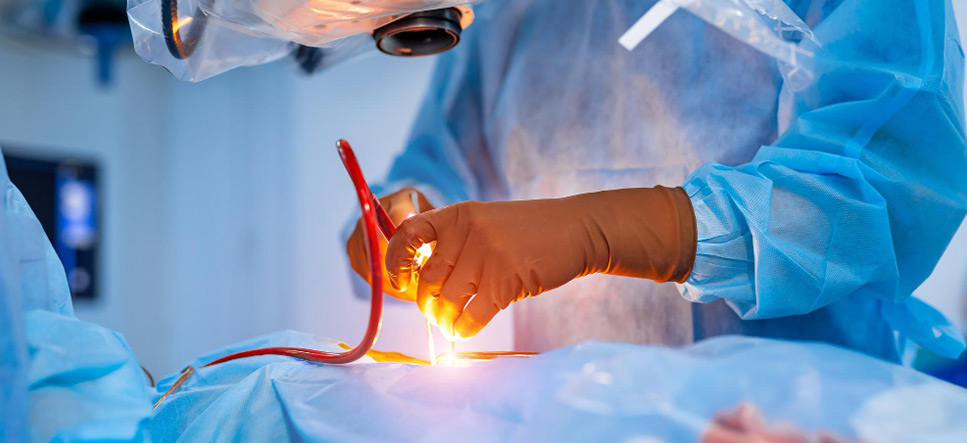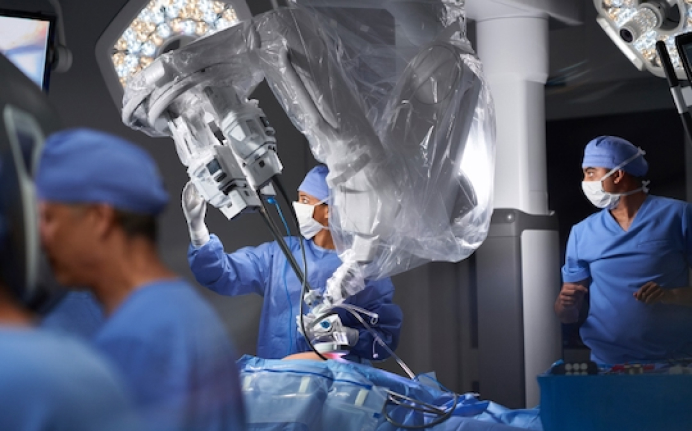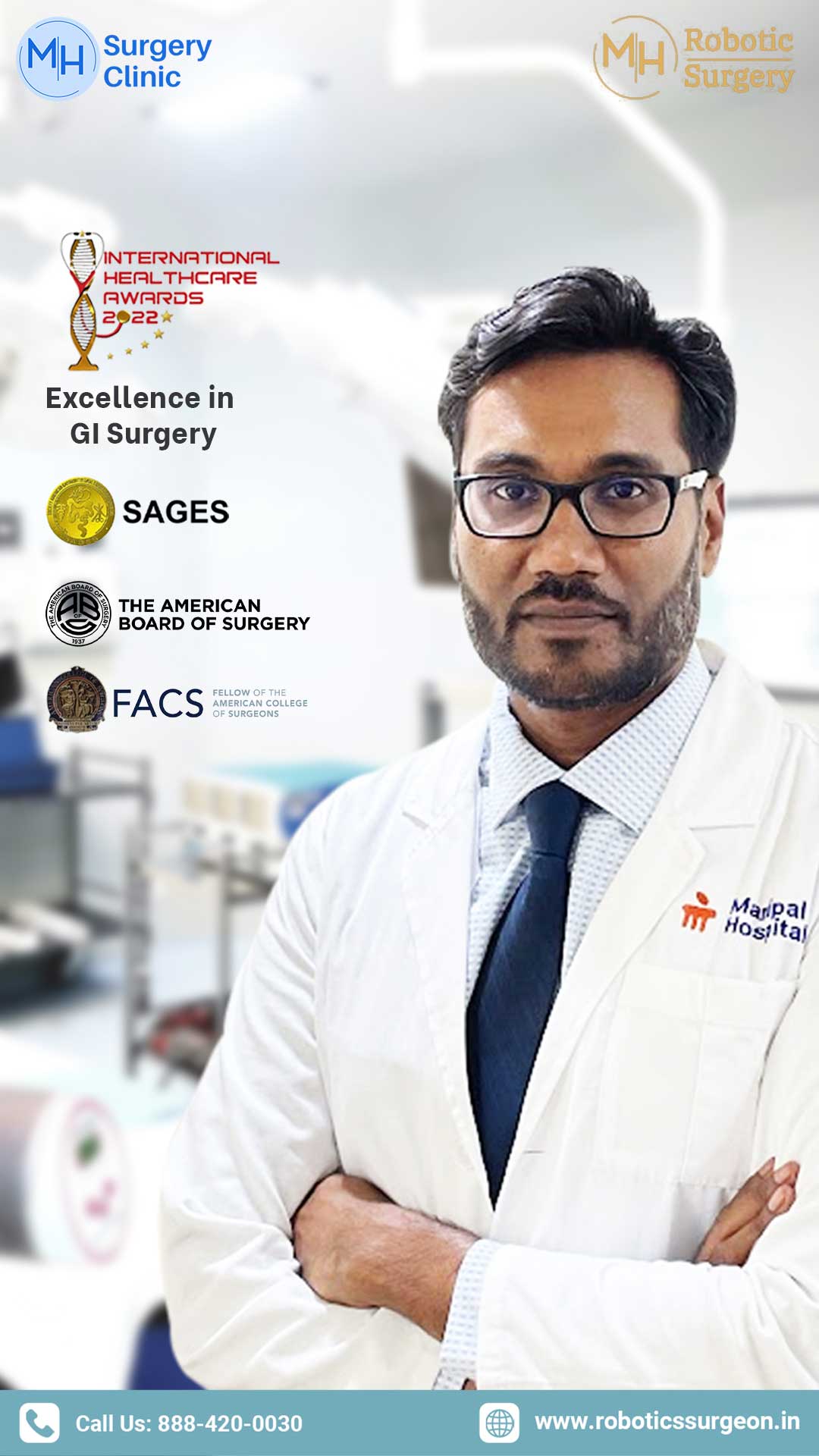
Robotic Pancreas Surgery
Transforming Pancreas Surgery with Advanced Robotic Techniques
About Robotic Pancreas Surgery

The use of robotics in the specific case of robotic pancreas surgery is a brilliant innovation in the field of organ treatment. This approach makes it possible for surgeons to perform very complicated operations with precision leading to fewer cases of complication and faster recovery. From cancers and cysts to chronic diseases, robosurgery avails patients a relatively safer and less invasive way. This new dimension in the treatment of pancreatic diseases is being carried out by the best pancreatic surgeons in India and is bringing about a significant difference in the quality of life of patients.
Key Types of Robotic Pancreas Surgeries Include:
- Robotic Distal Pancreatectomy: Pancreatoduodenectomy eradicates the body and the tail of the pancreas, commonly performed to treat pancreatic cancer or benign tumors.
- Robotic Whipple Procedure (Pancreaticoduodenectomy): A major operation to remove the tumor in the head of the pancreas that had a malignant potential. Precision and the short recovery time are what sets the robotic Whipple surgery apart.
- Robotic Total Pancreatectomy: It is primarily the removal of the entire pancreas which may be applicable for widespread diseases or multiple tumours.
- Robotic Central Pancreatectomy: Sparing of a part of the head and tail of the pancreas with the removal of the mid-portion which is useful in the case of localized tumors.
- Robotic Pancreatic Biopsy: A less invasive approach for staging pancreatic neuroendocrine tumors and other pathology.
- Robotic Drainage Procedures: Chronic pancreatitis should be treated through the clearance of obstructions of the pancreatic ducts.
- Robotic Islet Cell Transplantation: This may help to stabilize insulin as needed after massive pancreatic surgery.
Robotic Pancreas Surgery is Particularly Beneficial For The Following Conditions:
- Pancreatic Cancer: Technological effectivity explains that in availing robotic surgical procedures, surgeons get better sight and precision in removing tumors.
- Pancreatic Cysts: Robot-assisted surgery in the removal of the drainage process causes less trauma to the surrounding tissue.
- Chronic Pancreatitis: It has been established that there is decreased inflammation and fewer complications that are associated with surgical procedures.
- Pancreatic Neuroendocrine Tumors: These are rather rare tumors, which are removed employing a robotized system.
- Pancreatic Trauma: Robotic pancreatic surgery helps surgeons perform complex surgery to repair an injured pancreas.
- Benign Pancreatic Tumors: The tumors are excised without much interference with the normal tissues in the surrounding area.
- Pancreatic Fistulas: This condition is given medical attention with a certain degree of delicacy by cutting through robotic surgery.
- Pancreatic Divisum: Surgery is another way of managing this congenital abnormality and with increased use of robotic techniques the management becomes better.
It has been established that robotic surgery is helpful for cases like pancreatic cysts, chronic pancreatitis, pancreatic trauma, and pancreatic divisum, which can be treated with anatomic-based surgery that can help preserve pancreatic function. It is chosen by the best pancreatic doctors in India who perform surgery on the pancreas and for complicated cases such as benign tumors of the pancreas and pancreatic fistula.
This makes robotic pancreas surgery more preferred than the other traditional methods of carrying out the surgery by both the patients and robotics surgeons since the patients can recover quickly with little pain and with high precision.
Read Also: Robotic Gallbladder Surgery, Ventral Hernia
We are making robotic surgery a new standard of care

Patient-Centered Care
Prioritize patient safety and well-being in the development and implementation of robotic care. Involve patients in the decision-making process, provide clear information, and address their concerns and preferences. Conduct rigorous clinical trials and studies.
Interdisciplinary Teams
A multidisciplinary team of experts, including clinicians, roboticists, engineers, data scientists, and healthcare administrators, to collaborate on this initiative. Encourage open communication and collaboration which leads to better patient outcomes.
Cost-Effectiveness
Assess the cost-effectiveness of robotic care and explore ways to make it more accessible to a broader range of patients. Collaborate with healthcare payers and providers to ensure reimbursement for robotic procedures.
Education and Training
Develop comprehensive training programs for healthcare providers, ensuring that they have the necessary skills and knowledge to use robotic systems effectively. Offer ongoing education and certification and update on the latest advancements.What to expect with robotic-assisted surgery
If you or someone you know is scheduled for robotic-assisted surgery, it’s natural to have questions about what to expect before, during, and after the procedure. Robotic surgery is a transformative medical technology that has revolutionized the field of surgery by enhancing the capabilities of surgeons and improving patient outcomes. Here’s an overview of what you can typically anticipate when undergoing robotic-assisted surgery:

Before the Surgery
Consultation: You will have one or more consultations with your surgeon to discuss your medical condition, the surgical procedure, whether robotic-assisted surgery is the right option for you and any alternatives if there are any.
Preoperative Evaluation: Before the surgery, you may need to undergo several tests and evaluations to ensure you are a suitable candidate. This may include blood tests, imaging scans, and a review of your medical history.
Preparation: Your surgeon and healthcare team will provide specific instructions about how to prepare for the surgery. This may involve fasting for a certain period, discontinuing certain medications, and taking a shower with a special soap to reduce the risk of infection.
During the Surgery
Anesthesia: You will be given anesthesia to keep you pain-free and asleep during the surgery. The type of anesthesia (general or local) will depend on the specific procedure and your medical condition.
Operating Room Setup: In the operating room, the surgical team will position you on the operating table and prepare the surgical area. The robotic system will be set up, and your surgeon will be seated at the console.
Robotic Assistance: Your surgeon will control the robotic arms and instruments from the console. The robotic system provides enhanced precision and dexterity during the surgery.
After the Surgery
Recovery Room: After the surgery, you will be taken to a recovery area where you’ll gradually wake up from anesthesia. A nurse will monitor your condition closely.
Pain Management: You may experience some pain or discomfort after surgery. Your healthcare team will provide pain management medications as needed.
Hospital Stay: The length of your hospital stay will vary depending on the type of surgery and your individual recovery progress. Many robotic-assisted surgeries result in shorter hospital stays compared to traditional open surgery.
Why choose Robotic Surgery

Enhanced Vision
The robotic system delivers 3D high-definition views, giving your surgeon a crystal clear view of the surgical area that is magnified 10 times to what the human eye sees. This helps the surgeon perform surgery with greater accuracy and smoothness.

Precise movements
Robotic systems provide high precision and delicate motor control, lowering the possibility of human error. Surgeons utilize tiny devices that mimic human hands. Built-in tremor-filtration technology helps in smooth and precise movements.

Minimal Blood loss
Robotic surgery is minimally invasive, meaning it involves small incisions wiith minimal tissue damage resulting in less pain, and reduced scarring. Less blood means results in faster healing, less time in hospital and return to life sooner than expected.
FAQs
A pancreatic cyst can range in severity. In order to properly treat pancreatic cysts, Dr. Manjunath Haridas evaluates each case on an individual basis and offers professional advice and specialized treatment regimens.
It is best to stay away from hot and high-fat foods if you have pancreatic stones or cysts. Choose a diet low in alcohol and processed foods. A healthcare provider should be consulted in order to develop a customized diet plan that will help control symptoms and promote pancreatic health, according to Dr. Manjunath Haridas.
It is important to identify signs like fever or abdominal pain to diagnose a pancreatic fistula. In order to ensure timely intervention in the event that a pancreatic fistula is identified, Dr, Manjunath Haridas uses sophisticated diagnostic equipment for precise assessments. If you encounter these symptoms, speak with a member of our knowledgeable staff for an accurate assessment and tailored treatment.
The recovery period of a pancreatic fistula varies depending on the specific circumstances. Dr. Manjunath Haridas offers individualized treatment and keeps a careful eye on patients to speed up their recuperation. Speak with our experienced staff for precise evaluations and a customized treatment strategy for pancreatic fistula healing.
Robotic whipple surgery is a dangerous yet frequently required treatment for diseases like pancreatic cancer. Specializing in this intricate procedure, Dr. Manjunath Haridas uses cutting-edge methods to reduce risks and improve results. Throughout the Whipple resection surgery, our skilled staff prioritizes the well-being of our patients by providing thorough care.
Following Whipple surgery, alterations in digestion may be among the long-term problems. Dr. Manjunath Haridas prioritizes thorough postoperative care, addressing these issues to advance the general health of patients. Our staff ensures a customized strategy to reduce any long-term issues while keeping an eye on and supporting patients throughout their recuperation.
Pancreatic stone therapy is effectively provided by Dr. Manjunath Haridas the best pancreatic doctor in India, and offers options ranging from pills to minimally invasive operations. Our skilled team guarantees individualized treatment, reducing discomfort and enhancing pancreatic health. In order to treat pancreatic stones, we employ cutting-edge methods, customizing the regimen to meet the specific requirements of each patient for the best possible results.


